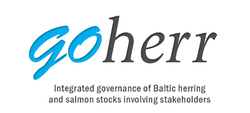Goherr: Difference between revisions
mNo edit summary |
|||
| Line 18: | Line 18: | ||
| [[Goherr: WP3 Scenarios and management objectives|WP3 - Scenarios and management objectives]] || RTD || 5 || UOULU || 33 || 1 || 28 | | [[Goherr: WP3 Scenarios and management objectives|WP3 - Scenarios and management objectives]] || RTD || 5 || UOULU || 33 || 1 || 28 | ||
|- | |- | ||
| [[Goherr: WP4 Linking fish physiology to food | | [[Goherr: WP4 Linking fish physiology to food production and bioaccumulation of dioxin|WP4 - Linking fish physiology to food production and bioaccumulation of dioxin]] || RTD || 4 || SLU || 42 || 1 || 34 | ||
|- | |- | ||
| [[Goherr: WP5 Linking the health of the Baltic Sea with health of humans: Dioxin|WP5 - Linking the health of the Baltic Sea with health of humans: Dioxin]] || RTD || 2 || THL || 39 || 1 || 36 | | [[Goherr: WP5 Linking the health of the Baltic Sea with health of humans: Dioxin|WP5 - Linking the health of the Baltic Sea with health of humans: Dioxin]] || RTD || 2 || THL || 39 || 1 || 36 | ||
Revision as of 11:56, 21 April 2015
Welcome to GOHERR - wikiIntegrated governance of Baltic herring and salmon stocks involving stakeholders
|
GOHERR overviewThe aim of GOHERR is to develop a novel integrated governance framework and a related decision support tool that combines the health of the Baltic Sea with the health of humans, and the dynamics of the ecosystem with human values and behaviour. By integrating the governance of two fish species and the sectoral, regional, national and sub-national as well as marine, coastal and river basin perspectives, the project aims at systematically identifying synergies or inefficiencies in the management of the socialecological system. The project will involve all stakeholders-in-chain for improving the capability of society to respond to the challenges of the Baltic Sea, from policy makers to fishermen and from scientists to consumers. The framework targets at successful implementation of ecosystem based management in the Baltic Sea, by applying and improving the tools of adaptive management and integrated management in order to enhance the coherency and efficiency of policy making and to improve the acceptability and resiliency of decisions (CEC 2008).
| ||||||||||||||||||||||||||||||||||||||||||||||||||||||||
Major meetings |
ContactsUniversity of Helsinki (UH) Coordinator: Sakari Kuikka; e-mail: sakari.kuikka@helsinki.fi Co-coordinator: Päivi Haapasaari, e-mail: phaapasa@mappi.helsinki.fi Researcher: Suvi Ignatius, e-mail: suvi.ignatius@helsinki.fi Manager?: Kirsi Hoviniemi, e-mail: kirsi.hoviniemi@helsinki.fi University of Oulu (UOul) Timo Karjalainen, e-mail: timopauli.karjalainen@oulu.fi Simo Sarkki, e-mail: simo.sarkki@oulu.fi Aalborg University (IFM-AAU) Alyne Delaney, e-mail: ad@ifm.aau.dk The Swedish University of Agricultural Sciences (SLU) Professor Anna Gardmark, e-mail: anna.gardmark@slu.se Johan Ostergren, e-mail: johan.ostergren@slu.se Magnus Huss, e-mail: magnus.huss@slu.se (on parental leave until?) Andreas Bryhn, e-mail: andreas.bryhn@slu.se National Institute for Health and Welfare (THL) Docent Jouni Tuomisto, e-mail jouni.tuomisto@thl.fi Researcher Arja Asikainen, e-mail: arja.asikainen@thl.fi | ||||||||||||||||||||||||||||||||||||||||||||||||||||||||
Goherr in OpasnetOpasnet is a wiki-based website and workspace for helping societal decisions. This portal page contains a brief introduction to the topic and links to relevant pages about Goherr. The information is structured for both scientific scrutiny and for policy use at the same time. In practice, you can do original research, store data, make models, and perform policy assessments and discuss all of that work in one workspace. You can start a new assessment about a decision of your own interest, or participate in an existing assessment. Anyone can solve common problems. Opasnet is the web workspace for solving them by you, and by us together. |


